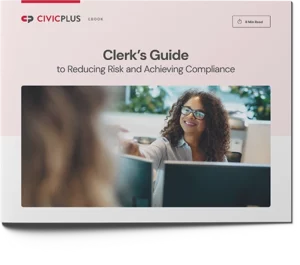What is the Open Meetings Act?
And What Happens if You Violate Your State Requirements?
Town hall meetings might serve as the foundation of American democracy, but their history dates all the way back to Ancient Greece where, in the fourteenth century citizens would gather in the “Agora” or “gathering place” to hear from leaders, purchase goods, and make decisions by popular vote. Generations later, we still gather peaceably to debate community initiatives, air grievances, and understand the legislative process. In modern times, our states have formalized requirements and expectations of open meetings. While there are some state-by-state variations, this article will broadly summarize what Open Meetings Acts are, the terminology local government staff need to understand, and what you risk if you fail to comply with your state’s requirements.
What are State Open Meeting Acts?
State Open Meeting Act laws, also known as sunshine laws or open meetings laws, are regulations and laws that require government agencies, boards, commissions, and other public bodies to conduct their meetings and decision-making processes transparently and openly. These laws are designed to ensure that government actions and deliberations are accessible to the public, promoting government accountability and preventing clandestine decision-making.
Key Aspects of State Open Meeting Acts:
While every state’s regulations vary, state Open Meeting Act laws typically include the following considerations:
Public Notice: Government bodies must provide advance notice of their meetings, including the date, time, location, and agenda. This notice is usually made available to the public through various means, such as posting on official websites, public bulletin boards, or in local newspapers.
Public Availability: Meetings of public bodies must generally allow residents to attend and observe the proceedings. There are typically exceptions for specific matters, such as personnel issues or litigation discussions, which can be discussed in closed or executive sessions.
Agendas: Public bodies must have a predetermined agenda for their meetings. This ensures that the public knows what topics will be discussed and allows for orderly proceedings.
Records: Minutes or records of meetings are usually kept and made available to the public. These records are a permanent record of the discussions and decisions made during the meetings.
Accessible Locations: Meetings are typically held in locations that are easily accessible to the public, and reasonable accommodations may be required to ensure participation by individuals with disabilities.
Quorum: A minimum number of members is usually required to be present for a meeting to be considered valid and to make decisions.
Compliance and Enforcement: State open meeting acts often include mechanisms for enforcement and penalties for violations. These may include fines, legal challenges, or the invalidation of decisions that violate the law.
What is a Gathering When it Comes to Public Meetings?
Understanding open meeting acts requires an understanding of a concept that also dates back generations: public gatherings. A gathering is a “coming together” of persons in a group. When there is a majority of a quorum of the members of a public body that has come together for the purpose of discussing public business, it constitutes a gathering. In today’s era of digital connectivity, physical presence is not required for a grouping of people to constitute a gathering. Groups can gather via:
- Phone
- Instant or text messages
- Chat rooms
- Video or audio conference
What Constitutes a Virtual Gathering Under Open Meeting Laws?
Electronic attendance rules have become especially important in recent years due to the increasing use of technology to facilitate remote participation in public events. The specific rules can vary by jurisdiction, organization, or governing body, but common elements include:
- Advance Notice: Public agencies or organizations hosting public gatherings must provide advance notice to the public about the option for electronic attendance. This notice typically includes information on how to access the meeting remotely, along with details about the meeting’s date, time, and agenda.
- Access and Accessibility: Rules should ensure that electronic access is provided to all interested parties. This may include providing closed captioning for individuals with hearing impairments or ensuring that the meeting platform is accessible to individuals with disabilities.
- Authentication and Verification: Participants attending electronically are often required to authenticate their identity. This may involve logging in with a secure account, using a unique identifier, or providing some form of verification to prevent unauthorized access.
- Public Comment and Participation: Provisions should be made for public comment and participation during electronic attendance. This might involve allowing attendees to submit questions or comments electronically or enabling video and audio interaction for remote participants.
- Quorum and Voting: Rules must address how quorum requirements are met for decision-making in public gatherings. Some regulations may require a minimum number of members to be physically present in the meeting space, while others may allow for virtual participation to meet a quorum.
- Recording and Documentation: Meetings attended electronically are typically recorded, and minutes or transcripts are maintained as part of the public record. This ensures transparency and accountability.
- Technical Considerations: Rules often stipulate technical requirements and standards for the electronic platform used, including provisions for backups and contingency plans in case of technical failures.
- Security and Privacy: Regulations often address security and privacy concerns, such as protecting against unauthorized access and ensuring the confidentiality of sensitive information.
- Public Access to Electronic Meetings: The public should have access to attend electronically, just as they would if they were attending in person. This may involve providing links or access codes to remote participants. Florida and Indiana are two states with specific requirements regarding public access to electronic meetings.
What Constitutes a Majority of a Quorum in Open Meeting Laws?
In the context of open meetings laws, the term “majority of a quorum” refers to a specific requirement for conducting official business or making decisions during a public body meeting. It’s a concept related to achieving a sufficient number of members present to take official actions. Here’s how it typically works:
Quorum: A quorum is the minimum number of members of a public body who must be present at a meeting for the meeting to be valid. The exact number required to establish a quorum can vary based on the rules or regulations governing the specific public body. The purpose of a quorum is to ensure that decisions are made by a representative group of the body rather than by just a few members.
Majority of a Quorum: Once a quorum is established, decisions and actions are often taken based on a majority vote of that quorum. In other words, it’s the minimum number of members necessary to conduct official business.
For example, let’s say a city council has nine members, and its quorum requirement is set at five members. If there are six council members present at a meeting, the “majority of a quorum,” in this case, would be three members, which means that to pass a motion or make an official decision, it would require the support of at least three out of the six members present. In this scenario, the “majority of a quorum” is three out of the five members needed for a quorum.
The purpose of the “majority of a quorum” concept is to balance ensuring that important decisions are made by a representative number of members (the quorum) while not imposing overly stringent requirements for approval. This allows public bodies to function effectively while maintaining accountability and transparency in their decision-making processes, as defined by open meetings laws and regulations specific to the jurisdiction. The exact definitions and rules may vary depending on the state or locality’s open meeting laws.
What Do Open Meeting Acts Require About Meeting Minutes?
Not only do most states’ Open meeting Acts have requirements about access to public meetings, many also have requirements about how what transpires at those meetings is documented and shared with the public. The following meeting minute requirements generally apply to Open Meeting Act laws:
- All public bodies shall keep written minutes of all meetings, whether open or closed
- Meeting must include the following information:
- The date, time and place of the meeting
- Members of the public body
- A summary of all discussion matters and votes taken
Under most state requirements, meeting minutes should be available for public inspection.
Do Open Meeting Act Laws Allow for Public Comment?
Most Open Meeting Act Laws allow some public comment. Any person may address public officials under rules that must be established and recorded by the public body. and special rules apply. The specific requirements and procedures for public comment can vary by jurisdiction and the details of the laws in place. However, the fundamental purpose of allowing public comment in open meetings is to promote transparency, accountability, and public participation in the decision-making processes of government agencies and public bodies.
Open Meeting Act Exemptions
Open meeting laws are designed to ensure transparency and openness in government proceedings. However, they often include specific exceptions or exemptions that allow certain discussions or deliberations to occur in private or closed sessions. These exceptions are typically included to protect sensitive information, personal privacy, and other legitimate interests. The specifics of these exceptions can vary from one jurisdiction to another, but common exceptions may include:
- Personnel Matters: Deliberations concerning the hiring, firing, or performance evaluations of government employees are often conducted in closed sessions to protect the privacy of the individuals involved.
- Legal Matters: Discussions related to ongoing or potential legal actions, including attorney-client privilege or strategy discussions, are often exempt from open meeting laws.
- Real Estate Transactions: Negotiations or discussions about the purchase, sale, or lease of real property may be conducted privately to avoid compromising the government’s bargaining position.
- National Security: Matters related to national security or sensitive law enforcement operations are typically exempt from open meeting laws.
- Collective Bargaining: Discussions between government agencies and labor unions regarding labor contracts may be held in closed sessions to protect the bargaining process.
- Executive Sessions: Some open meeting laws allow for executive sessions, which are closed-door meetings for specific purposes, such as personnel matters, pending litigation, or security issues.
- Certain Personnel Records: The release or discussion of particular personnel records, medical records, or other confidential information may be restricted.
- Trade Secrets: Discussions involving trade secrets, proprietary information, or disclosing confidential business records may be exempt to protect commercial interests.
- Security and Safety Concerns: To avoid compromising the security of government buildings or facilities, discussions about security measures and vulnerabilities may be kept confidential.
- Confidential Information: Information subject to confidentiality agreements or sensitive data, such as specific investigative reports, may be protected from public disclosure.
- Student Records: In the case of educational institutions, discussions involving individual student records and disciplinary matters may be confidential.
- Health and Medical Information: Privacy laws often protect discussions about individuals’ health and medical information during meetings.
Political Strategy Meeting Exemptions
Under specific circumstances, a gathering may be exempt from open meeting laws if defined as a political strategy meeting. Again, while regulations vary by state, generally, for a meeting to be considered a political strategy meeting and potentially exempt from public record laws, it must meet the following criteria:
- The meeting should primarily focus on political strategy or political campaign-related discussions. This may include discussions related to campaign tactics, messaging, fundraising, voter outreach, and other aspects of political campaigning.
- The meeting participants should typically act in their official capacity as public officials or employees. The discussions may not qualify for an exemption if they are purely personal or unrelated to official duties.
- An exemption as defined by the jurisdiction’s public record laws.
- Depending on the jurisdiction, political strategy meetings may be conducted in a closed or executive session, typically a private session within a larger public meeting.
- Legal counsel or the government attorney deems it qualifies for exemption from public record laws.
What Happens if a Local Government Fails to Comply with Open Meeting Act Laws
If a local government or public body fails to comply with open meeting act laws, there can be legal consequences, and actions may be taken to address the non-compliance. The specific penalties and remedies for violations can vary depending on the jurisdiction and the nature and severity of the violation, but common consequences may include:
- Invalidation of Actions: In some cases, actions or decisions made during a meeting that violated open meeting laws may be invalidated. This means any actions violating the law may be rendered null and void.
- Legal Challenges: Members of the public or interested parties may file legal challenges or lawsuits to challenge the violation of open meeting laws. These legal actions can seek to enforce compliance or seek damages.
- Fines and Penalties: Open meeting laws often include provisions for fines or penalties for non-compliance. The fines can vary in amount and may be levied against individual members of the public body, the government agency as a whole, or both.
- Mandatory Training and Education: Public officials who violate open meeting laws may be required to undergo training or education on these laws to prevent future violations.
- Public Censure or Impeachment: In extreme cases of non-compliance, public officials may face censure by their governing body or even impeachment.
- Attorney’s Fees: Some open meeting laws allow for the recovery of attorney’s fees by individuals or organizations that successfully challenge violations in court.
- Public Relations Impact: Non-compliance with open meeting laws can hurt the reputation of the government agency and its officials. It can erode public trust and confidence in the government’s transparency and accountability.
To address Open Meeting Act violations or to seek remedies, individuals or organizations often have the option to file complaints with relevant oversight agencies or take legal action through the courts. Legal counsel with expertise in open meeting laws can guide those seeking to address violations or remedy non-compliance. Open meeting laws aim to ensure transparency and accountability in government operations, and enforcement mechanisms are in place to help achieve these goals.
Conclusions and Advice for Clerks
Open Meeting Act laws play a pivotal role in upholding the principles of transparency, accountability, and public participation in the functioning of local governments. These laws mandate that government agencies and public bodies conduct their meetings and decision-making processes in an open and accessible manner. However, local governments face significant risks when failing to comply with these laws. Failure to do so can result in legal consequences, including the invalidation of decisions, fines, legal challenges, and damage to public trust.



